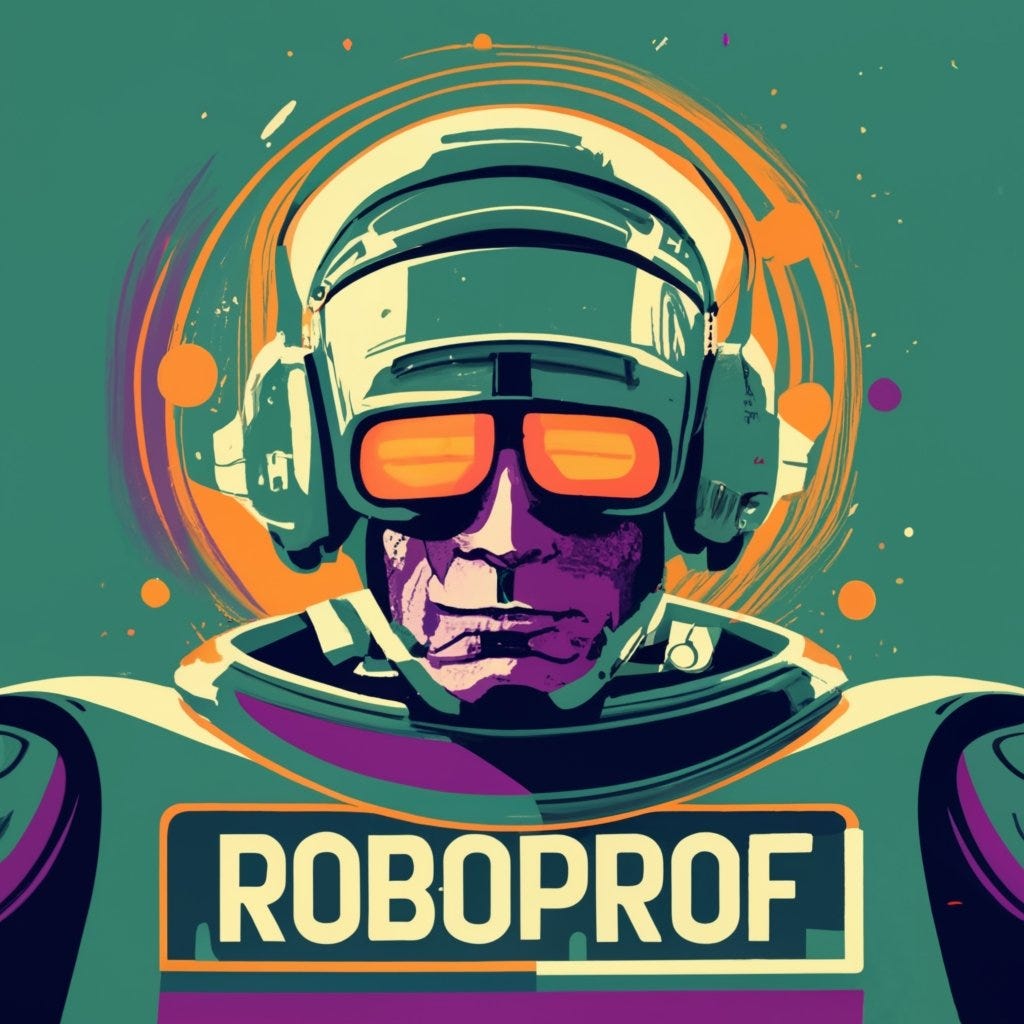Roboprof: the AI-enhanced teacher
New insights into the potential of combining the expertise of human teachers with the power of AI.
One question I’ve been asked a lot recently is, will AI replace teachers?
The short answer - based on what we know about how AI works - is that the most likely future is one where AI is used to augment, rather than automate human teaching.
A study published last month which explores the use of an AI tutor app at UniDistance Suisse provides one of the clearest glimpses yet into what this might look like in practice.
Let’s dive in!
How to Build an AI Tutor
Contributing to a growing body of experimentation with AI tutoring by folks like Khan Academy and Harvard, “Implementing Learning Principles with a Personal AI Tutor: A Case Study”, explores how we might build and implement an AI tutor app capable of enhancing students’ knowledge acquisition.
What’s new about this research is that it details not just what the AI tutor could do but also how it was built and trained. Here’s the TLDR:
Built & trained by education experts: The app was built by educators who used their understanding of instructional design, including key learning principles like retrieval practice and spaced repetition, to build a specialised AI tutor for higher ed.
Trained on specialised source data: The AI tutor was first trained to generate questions from existing course materials. In practice, this means developers leveraged AI's natural language skills to automatically create a large set of relevant questions from the course content.
They did this by feeding GPT-3 the course materials - things like lecture slides and readings - and prompting it prompted it to create multiple choice questions, fill in the blanks, etc based on those materials.
For example, if a slide mentioned "dopamine", GPT-3 could generate a question like "Dopamine is a ____ that functions as a neurotransmitter" and know what the correct answer was, based on the input data.
Use of neural networks for personalisation, assessment & feedback: Next, developers used neural networks - which are AI systems loosely inspired by the human brain - to track and learn about patterns in student responses to questions.
As students answered questions in the app, it tracked things like which questions they got right or wrong.
This interaction data was fed into a neural network, which looked for patterns in how students responded. Over time, it strengthened connections and improved its ability to predict if a student would get a particular question correct.
After a short amount of training on student data, the network could take a student and question, and output an estimated percentage chance that the student would answer it correctly. This percent chance was called the "grasp score".
So, in essence, the neural network used students' past responses to continuously improve its ability to predict how well they knew each concept, enabling the app to personalise specific questions for specific students, provide differentiated feedback and deliver student performance data. Nice!
Key Findings & Implications
51 Psychology students at UniDistance Suisse used the app for a neuroscience course over the course of one semester.
Students who used the app got significantly higher exam grades, improving their percentile ranking by up to 15 points compared to a parallel course without the AI tutor.
The neural network predictions of students' grasp of concepts correlated strongly with exam performance, validating the models' effectiveness in understanding and predicting student performance.
Overall, the results suggest personal AI tutors can enhance academic achievement by modelling human learning and implementing effective learning strategies tailored to an individuals’ needs.
The study demonstrates the potential of AI to provide personalised support grounded in learning sciences, addressing challenges in delivering hard-to-implement principles like spaced practice, repetition and personalised learning.
Concluding Thoughts
This study shows some exciting and promising results for the co-creation of AI with specialist educators - an emerging category of “Educational AI”.
By combining the expertise of human teachers with the power of AI, researchers have been able to augment the teaching process and improve student outcomes.
The potential impact here is huge. Imagine a world where:
AI tutors can deliver individualized learning experiences tailored to each student's needs, potentially leading to improved academic outcomes.
Neural network models can provide educators with data-driven insights into each student's grasp of concepts, enabling targeted interventions.
AI can help in effectively implementing learning principles like spaced repetition and retrieval practice, which are often challenging to execute & scale in traditional settings.
That said, there’s still a long way to go and lot more to learn. So, where might we go from here?
More testing, with more learners:
The study had a relatively small sample of only 51 students, all from higher ed.
Students self-selected their level of app usage, so more motivated students may have used it more. Their motivation could have contributed to higher grades, not just the app.
More testing, in more contexts:
The study focused on knowledge gain in the higher ed context. Is it possible to build algorithms which are capable of developing not just conceptual understanding but also behaviours and skills?
The AI tutor was an “add-on” to a teaching experience that was otherwise analogue and human heavy. How the impact of the AI change when it’s used in isolation, i.e. as a replacement for, rather than extension of, a human teacher?
Happy innovating!
Phil 👋
PS: If you design learning experiences and want to get hands on and experiment with AI supported by me, you can apply for a place on an upcoming cohort of my AI-Powered Learning Science Bootcamp here.
PPS: If you work in L&D and want to stay ahead of the AI curve, you can apply to take part in my AI pilot (or just sign up to learn more about it) here.




